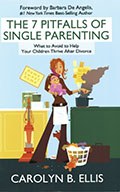
By Carolyn Ellis
Divorce can be complicated if you have children and you need to learn how to be co-parents. Effective co-parenting requires shifting from a romantic/intimate relationship with your ex-spouse into a more business-like partnership that focuses on raising your children together successfully.
To do this successfully, you must start to pull out the emotional hooks that you have embedded in your psyche. The most important mantra you can use in co-parenting is: “What my ex thinks of me is none of my business.” Yes, that’s right—to have emotional freedom and to take full responsibility for your life after divorce, the most important shift in awareness that you can make is to realize that what your ex-spouse thinks of you is absolutely none of your business.
Don Miguel Ruiz, author of The Four Agreements: A Practical Guide to Personal Freedom, says, “Not taking anything personally does not mean that you will not have a reaction or you will not take action. But when you take action, you have clarity. You know exactly what you want. When you take things personally, you do things you don’t want to do and say things you don’t want to say, because emotions are controlling you.”
Notice how you feel about this idea right now. Do you feel yourself resisting it? “But I want him to understand what I’m doing so he doesn’t sabotage me!” “She’s going to bad-mouth me all over town, so I have to manage my risk!” If you’re hearing a lot of inner dialog welling up in opposition, that means right now you’re actually pretty committed to spending a lot of your emotional and psychic energy in an area you have absolutely no control over. Does this sound like a good strategic choice to you?
Let’s face it—most of us were raised to believe that to be a “good girl” or a “good boy” we needed to care about other people’s feelings. Yes, it is important to have respect for their feelings and not to be callous and deliberately vindictive with others. However, many of us have gone too far in taking responsibility for other people’s feelings and emotional well-being. This seemingly “kind” act actually has a number of potentially destructive outcomes.
When you make what other people think or feel about you more important than what you think or feel about yourself, you feel dissatisfied and ultimately resentful. Needing to please others, to have them approve of you or “like” you, victimizes you. You set yourself up for feeling powerless in your own life.
Now take a look at how this plays out specifically with your former spouse. Be honest with yourself—did your ex like, respect, or agree with you when you were married? Chances are, not enough, otherwise you might not be divorced now. If your ex-partner didn’t “get” you or respect you when you were married, how is that suddenly going to turn around now that you’re divorced and co-parenting?
Worrying and getting upset about what your ex-spouse will think or feel or say about you is simply a habitual distraction sidelines you from looking at how you feel about your situation and seeing what you need to do. If you try to go on the offensive and start retaliating in some way, you’re just engaging in a power struggle that will take you nowhere fast and leave you feeling bitter and exhausted. The likely victims from that power struggle will be your children.
The only thing you do have control over is you—the thoughts you think, the actions you take, the things you say, the feelings you have. Your ex-spouse can worry about he or she feels about you. Your ex-spouse is a grown-up and can take care of him- or herself.
Letting go of what your ex thinks about you means you can reclaim some of the energy you’ve been frittering away worrying about things you have no control over. That’s when things have the possibility of turning around. You gain so much freedom in letting go of the fantasy that your ex-spouse should behave, act, or think in a certain way. Suffering comes when your fantasy is different from the reality you’re living. The ironic thing is that after you let your fantasy go and start taking responsibility for what you do have control over, that’s probably when your ex will start to behave differently.








